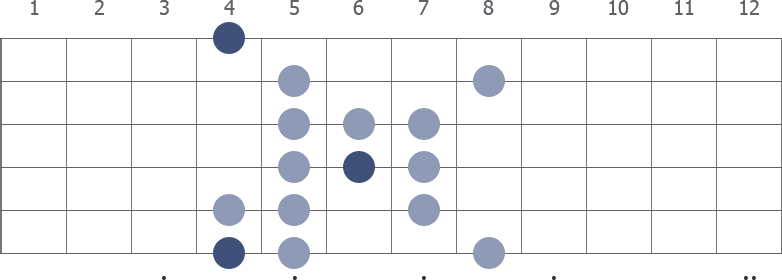G# Persian
G sharp Persian scale for guitar.
The G# Persian is a seven-note scale. Notes are displayed in the diagram with blue color with the root notes indicated by darker color. In the two-octave pattern, the first root note (the tonic) appears on the 6th string, 4th fret.
G#
2 octaves
 Notes: G# - A - B# - C# - D - E - F##
Intervals: 1 - 3 - 1 - 1 - 2 - 3 - 1
Type: Septonic
Notes: G# - A - B# - C# - D - E - F##
Intervals: 1 - 3 - 1 - 1 - 2 - 3 - 1
Type: Septonic
The scale displayed with its numeric formula, notes, intervals and scale degrees.
| Formula | Notes | Intervals | Degrees |
|---|---|---|---|
| 1 | G# | Unison | Tonic |
| b2 | A | Minor second | Supertonic |
| 3 | B# | Major third | Mediant |
| 4 | C# | Perfect fourth | Subdominant |
| b5 | D | Diminished fifth | Dominant |
| b6 | E | Minor sixth | Submediant |
| 7 | F## | Major seventh | Leading tone |
The third degree is written as B#, which is the same as C. The seventh degree is written as F##, which is the same as G. A practice in a scale notation is to not include the same letter twice, if it can be avoided.
The G sharp Persian consists of seven notes. These can be described as steps according to the following formula: half, whole and a half, half, half, whole, whole and a half and half from the first note to the same in the next octave.
The scale can be played on the guitar from different starting positions in which G# functions as the tonic.
G# Persian has similarities with G# Gypsy Major, G# Locrian and G# Phrygian Dominant Mode.
This scale is foremost used in Persian and Middle East music.
When harmonized, only the second and fourth degrees are matched with common major or minor triads, A and C#m that is.
One way to learn this scale is to observe the two chromatic sequences as well as the two tree-step intervals in each octave.